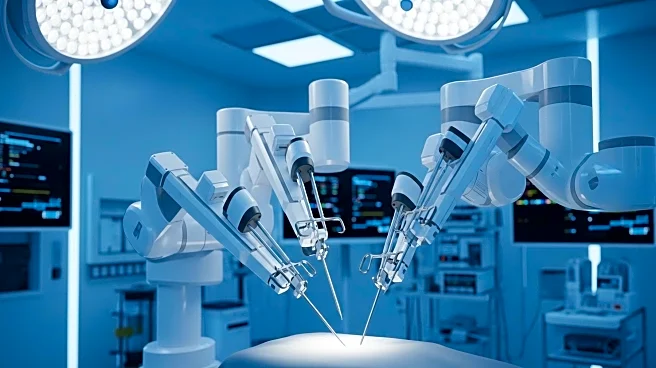What's Happening?
Medical Microinstruments Inc. (MMI) has successfully completed the first cases using its Symani Surgical System in a robotic neurosurgical clinical trial. Sponsored by the Jacobs Institute, the trial took place at Buffalo General Medical Center/Gates Vascular Institute. This marks a significant advancement from MMI's 2024 preclinical study, demonstrating Symani's potential in brain surgery. The system combines small, wristed micro-instruments with tremor-reducing and motion-scaling technologies, aiming to enhance precision in delicate neurosurgical procedures. The study, led by Dr. Adnan Siddiqui, focused on indirect bypass surgery for Moyamoya Disease, showcasing the system's ability to perform minute surgical moves on the pulsating brain.
Why It's Important?
The successful application of the Symani Surgical System in neurosurgery represents a major step forward in robotic microsurgery, particularly in complex brain surgeries. This technology could significantly improve patient outcomes by reducing the risks associated with traditional surgical methods, such as stroke and paralysis. The FDA-approved study supports the growing demand for advanced neurovascular treatments, potentially transforming patient care through enhanced precision and control. As robotic surgery continues to evolve, it may offer new opportunities for surgeons to address complex conditions, improving the quality of life for many patients.
What's Next?
The Jacobs Institute plans to further assess the safety and effectiveness of the Symani system in robotic-assisted neurosurgery. Dr. Siddiqui will present the initial findings at the Congress of Neurological Surgeons Annual Meeting, potentially influencing future research and development in robotic surgery. As the technology gains traction, it may lead to broader adoption in neurosurgical practices, prompting regulatory evaluations for expanded applications. Continued investment in robotic surgery could drive innovation, leading to more advanced systems capable of addressing a wider range of medical conditions.
Beyond the Headlines
The integration of robotic systems in neurosurgery raises ethical and legal considerations, particularly regarding the balance between human skill and machine precision. As technology advances, it may challenge traditional surgical practices, necessitating new training protocols and regulatory frameworks. The long-term impact could include shifts in surgical education and healthcare delivery, emphasizing the role of robotics in enhancing surgical outcomes.









